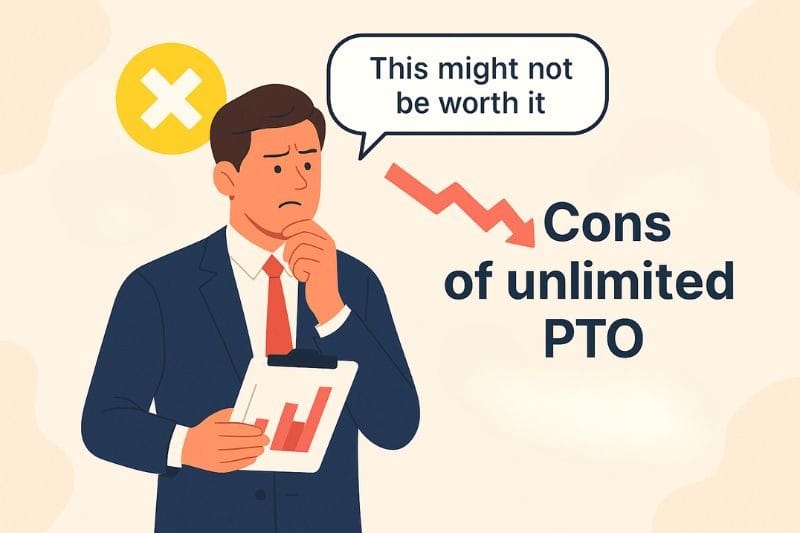Unlimited PTO Pros and Cons: Is It Good or Bad?
Thinking of implementing unlimited PTO? Explore the real pros and cons from both the employer and employee perspectives. Learn how to manage PTO with BuddiesHR.

Unlimited PTO (UPTO)is one of those topics that HR professionals love to hate at the moment. Since it gained traction with the global workforce (mostly in tech, startups, and project-based companies), a debate has been raging about whether it is a good or bad idea.
Google ‘unlimited PTO reddit’ and you’ll get such a mixed bag of answers that you still won’t know whether you should or shouldn’t implement it. Here at BuddiesHR, we decided the only way through this debate is to weigh up both sides and let you decide what suits your business. Join us as we make sense of the unlimited PTO policy.
Key Takeaways
- Unlimited PTO allows employees to take as much free time as they want (including sick days), as long as there’s no policy abuse.
- It’s popular amongst startups and progressive companies focused on employee retention.
- Clear guidelines are a must to avoid excessive time off and encourage a healthy work-life balance.
Table of Contents
Unlimited PTO: A definition
Unlimited PTO (UPTO) is a leave policy that provides as much paid time off as an employee needs in a year. It is often combined with flexible time off (where sick time, public holidays, and maternity leave are combined into one pool), or is used to refer only to paid annual vacation days. It is the opposite of an accrued leave policy, where you ‘earn’ days off in relation to how much time you’ve worked.
Pros of unlimited PTO

1. Enhanced work-life balance
Employees who love unlimited PTO swear by the fact that it enhances work-life balance to such a degree that they no longer want to take jobs with leave accrual systems. [1] That being said, the sentiment is unmistakable that this only works when management fully supports the policy.
🤓 We’re not talking about accruals here, but if you want to contrast unlimited PTO with how an accrual system works, our Guide to PTO Accruals explains everything you need to know.
2. Stronger ability to attract and retain top talent
With so many employees looking for unlimited leave benefits, the unlimited PTO policy is a powerful drawcard. When referring to top talent, we’re talking about self-driven performers who make company results and their mental health a top priority. In a nutshell, the kind of employee who works hard and plays hard.
3. Culture of trust and autonomy
The bottom line is: Adults want to be treated as adults. That means no policing, no long explanations when they need time off, and no guilt about wanting to rest. Where a culture supports this way of thinking, employees are more likely to take ownership of their responsibilities. They live out the unspoken ethos of: ‘We take care of the business, they take care of us’.
4. Simplified process for HR and managers
No accruals, rollovers, or payouts for unused leave mean fewer spreadsheets and less administrative work for HR departments. But that doesn’t mean you shouldn’t track unlimited PTO.
When combined with a vacation tracker, like Palmy Vacation, the admin doesn’t increase, but you do get powerful decision-making analytics. You may not need to track accruals, but you do need to know when time off, sick days, and other paid time off are getting out of control.
Cons of unlimited PTO

1. Employees take less time off than with accrual systems
This is one of those outliers that most businesses couldn’t have predicted. By giving employees more freedom, they end up taking less time off. The fear of what team members will think, not wanting to let others down, and worries about missed deadlines are at the root of this thinking. To prevent this, employers set a minimum number of days to be taken per year. [1]
2. Unclear guidelines lead to inconsistency
Without clear guidelines, managers will use their own interpretations. For example, one manager may cap the number of days approved, while another allows for 3-4 weeks' vacation at one time, leaving the team understaffed. Both cases can be prevented by providing clear guidelines for managers to follow.
Need help structuring a PTO policy? 👉 Find PTO company examples and templates.
3. No payout for unused vacation time
This point is one often mentioned during PTO discussions. With most accrual systems, workers receive a payout for unused leave when they resign. But it's a huge liability for the company to have unpaid vacation time on the books. With unlimited PTO, it’s a use it or lose it game, precisely because financial payouts of unlimited leave will be crippling for the business.
4. Policy abuse
While rare, there’s always the chance that employees will abuse an unlimited PTO policy. This is more likely in environments where the culture isn’t high-performance, high-rewards. Where this is lacking, unlimited PTO may be too much of a temptation and lead to further unproductive behavior.
Who does unlimited PTO work best for?
This strategy definitely isn’t a one-size-fits-all approach. It’s best suited for organizations that:
- Focus on results, rather than rigid schedules.
- Have a mature culture of accountability.
- Employee knowledge workers, rather than shift-based employees.
- Value flexibility, trust, and autonomy
What should a good PTO policy look like?

AI and Future of Work advocate Oz Rashid has an interesting three-point take on what an unlimited PTO policy should look like:
- A mandatory minimum number of days off per year that employees must take.
- Clear guidelines for how many people can be off at one time, in one department.
- No-contact rules to ensure people actually rest when they’re away from the office.
We believe he has a good point, and to round off your policy nicely, we can also add:
- Model the behavior you want to see - let employees see managers taking time off but also making sure business doesn’t suffer - then they’ll follow that lead.
- Use a vacation tracker to help you manage leave requests, scheduling, and increase visibility across teams.
Conclusion
Unlimited PTO (which allows employees to take as much vacation time as they need) has a number of benefits for companies, such as an increase in employee morale, increased productivity, and increased employee well-being. However, it also has a downside where policy abuse, missed deadlines, and employee reluctance to use time off decrease its effectiveness.
With a well-balanced unlimited PTO policy that provides clear guidelines and a minimum number of days to be taken per year, this strategy can work to attract top talent and prevent stress-related illnesses.
Ready to turn unlimited PTO into a benefit?
With BuddiesHR, HR teams can set clear leave guidelines, automate approvals, and track employee time off, all in one place. Whether your company offers traditional or unlimited vacation days, BuddiesHR helps you create transparency, trust, and balance.
👉 Start building a healthier PTO culture today with BuddiesHR.
Frequently Asked Questions
1. How many days should you take off a year with unlimited PTO?
This number varies greatly from company to company, and even between employees. Some feel they can take up to 8 weeks, while others take between 15 to 25 days. One report showed that an average of 16 days is taken by employees with unlimited PTO.
2. Is unlimited vacation a red flag?
It has been suggested that unlimited vacation time is a red flag for prospective employees, signaling a company that wants to eliminate leave payouts at resignation. These assertions can only be true if the company culture discourages taking vacation time. If a company readily agrees to unlimited time off, the employee doesn’t lose anything.
3. Does unlimited PTO reduce burnout?
Unlimited PTO can reduce burnout if employees feel free to take the time off that they need. It can also have the opposite effect - causing burnout because workers are afraid to take vacation days, fearing their commitment will be questioned. The unlimited PTO policy should set a number of days per year that can be taken if the intention is to avoid burnout.
4. Is unlimited PTO better than accrued PTO?
Unlimited paid time off is neither better nor worse than accrued PTO. It is highly dependent on the type of business, the company culture, and the HR department that runs it. Both strategies have advantages in the competitive job market, and both can be badly managed, eradicating the benefits.
5. Should companies track unlimited PTO?
Absolutely. Even if time off isn’t capped, tracking it provides benefits such as the ability to respond quickly to increased absenteeism, check which teams are using unlimited vacation days, and the ability to plan for leave requests. Unlimited PTO does not eliminate the need for tracking; it merely allows employees to take the leave they need.
References




